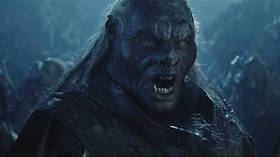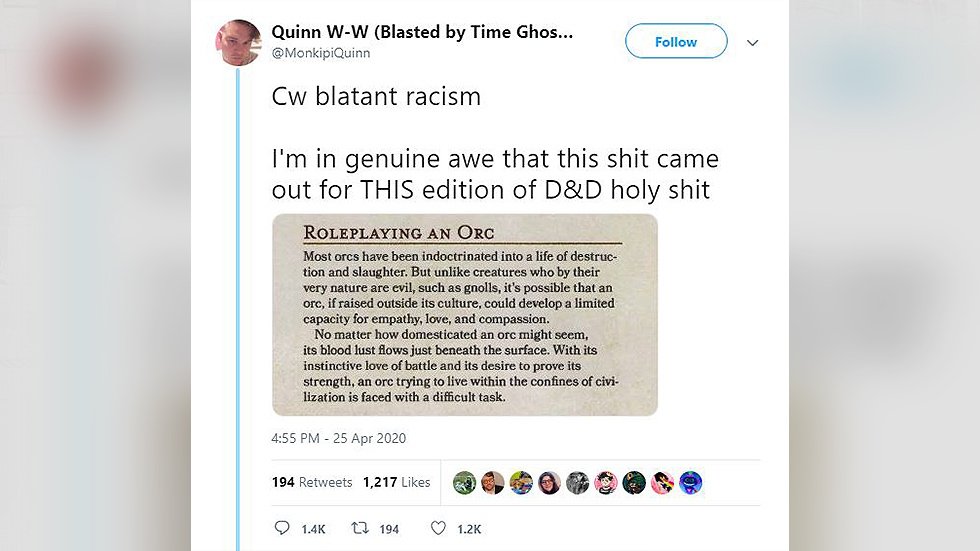Won’t someone think of the Orcs? Fantasy is only racist if you can’t understand tropes

Orcs, a mainstay of fantasy fiction, have been trending recently as the new target of the woke brigade, dusting off the allegations of racism to sic social justice mobs on content creators.
To say that Orcs are a staple of fantasy fiction would be a bit of an understatement. If you’ve seen the Lord of the Rings films, read the books, or played Dungeons and Dragons or any Warhammer subsidiary, you likely know what they are. They’re ugly monsters that generally are bad guys in most universes in which they appear.
As time has gone on, numerous attempts have been made by the politically correct crowd to brand these fictional monsters as some sort of racist allegory – including the recent spike of the term ‘orc’ trending on ‘Woke Twitter.’ The creators singled out this time are the Wizards of the Coast, who own, and have owned for decades, the Dungeons and Dragons franchise.
It’s ironic that the game once targeted in the 'Satanic Panic' of the 1980s (when D&D, with its monsters, demons and spells, was accused of being linked with devil worship), is now the target of a brand new bunch of tyrants. This time, it’s not enraged soccer moms and ignorant preachers – it’s grown people with pronouns in their bios and blue checkmarks next to their Twitter handles. But the righteous indignation is the same – as is the narrow-minded drive to ruin other people’s fun.

Anyone who is saying that this discourse is about anything else is being obtuse or smokescreening. Or they're just ACTUALLY racist, which, well, to be expected with ttrpg grognard discourse generally
— dante 🌹 (@videodante) April 26, 2020
Let’s look at the argument though. The statement, as summed up on popular social justice message board Resetera, is that the descriptions used in D&D that describe playing as an orc “mirrors the racist tropes and narratives about indigenous and black people that [were] used to justify colonialism.” It goes on to call it a trope of colonialism, the “original sin of the modern age.”
Guess what, though? Orcs are not a colonialist trope. They are a fiction trope. If we look at the original orcs, the Lord of the Rings orcs – they are the stereotypical ‘faceless enemy’ species. Something for the protagonists to fight. Calling that ‘racism’ is like calling the depiction of aliens in Independence Day or the Alien franchise racist. The ‘enemy race’ exists to create conflict. Admittedly, it is possibly the least subtle way of creating conflict, but a viable one, especially for a genre called ‘Heroic Fantasy.’
As time went on and the fantasy genre developed, various authors sought to put more nuance on their orcs, while maintaining their distinct orc-ishness. From a faceless enemy they became a playable race, and some interesting turns were taken – like the Blizzard orcs, a warrior people not bereft of their own brand of nobility, or the Warhammer 40k orcs, who grow from spores and can jury-rig a spaceship. But the underlying tone has always been the same: orcs are a martial bunch that value strength and have little use for the trappings of civilization.
The description used by Wizards of the Coast is hardly incendiary and is quite tame. The picture painted is of a warrior culture that can shed barbarism if they’re not raised that way, but will always have a fighting instinct. The same can be said of any “proud warrior race” in fiction. Whether it’s the Mandalorians from Star Wars, the Krogan from Mass Effect, or the Klingons in Star Trek, this is a generic descriptor for anyone raised in a war-like culture.
And all those are fictional tropes. Easy tools used by creators to move their narratives forward, or – in D&D’s case – by players to try on a new role without having to take acting classes and write an essay on the character’s past and motives. Plenty of people play as orcs because they enjoy the easy outlet that stereotype provides for their own heroic fantasy.
But the woke brigade won’t let us have unsupervised fun. These people are twisting the descriptions of fantasy orcs to imply malicious racist intent. These same folks tend to complain about racist “dog whistles” – but if you’re the only one hearing the supposed whistle, then you are the proverbial dog!
"Orcs represent black people and I know because when I see an orc, I think of black people because I secretly think of black people as disorganized, bloodthirsty monsters with low intelligence and a predilection for violence. You're racist if you don't agree. I am very smart." pic.twitter.com/lQtWKQ5SIj
— Possum Reviews (@ReviewsPossum) April 27, 2020
Describing someone as a “savage” doesn’t mean the user of the word is racist against Native Americans because they were called savages circa the 1800s. It’s a ludicrous tactic used to police speech.
Writers use these descriptors as a base for character building. Despite what Roland Barthes said in ‘The Death of the Author,’ the intent of a creator matters. The concept of interpretive tyranny is nonsense. If you are going to claim that someone is a racist and use their work as an example, the argument has to be able to stand on something. Racism as a concept requires malice by definition, and if you cannot prove malice, you have no argument.
I have written fantasy, and I feel as a creator, I’m being censored by people who want to see hidden meaning behind an ugly, imaginary monster. Here in the US, our Supreme Court had a decision on a case called Brown v. the EMA that was in favor of game creators. It stated that games were an art form, and the decision could be stretched to other media as well given that the arguments made were in favor of creative effort. So here in the US, these works are protected under our First Amendment.
There is perhaps no greater example of "woke culture" being a special combination of boredom, privilege, and the desperate desire to signal virtue than championing orc rights. pic.twitter.com/u05WrDCVLj
— Brad Glasgow (@Brad_Glasgow) April 27, 2020
Unable to ban creative effort, wokescolds instead try to publicly guilt-shame creators into self-censorship. It’s a nefarious tactic that has no place in polite society.
Ultimately, it’s hard to say whether or not Wizards of the Coast will capitulate to their social pressure. If they have any stones, they’ll tell Woke Twitter that they like their orcs and they’re going to keep their orcs.
Think your friends would be interested? Share this story!
The statements, views and opinions expressed in this column are solely those of the author and do not necessarily represent those of RT.
















